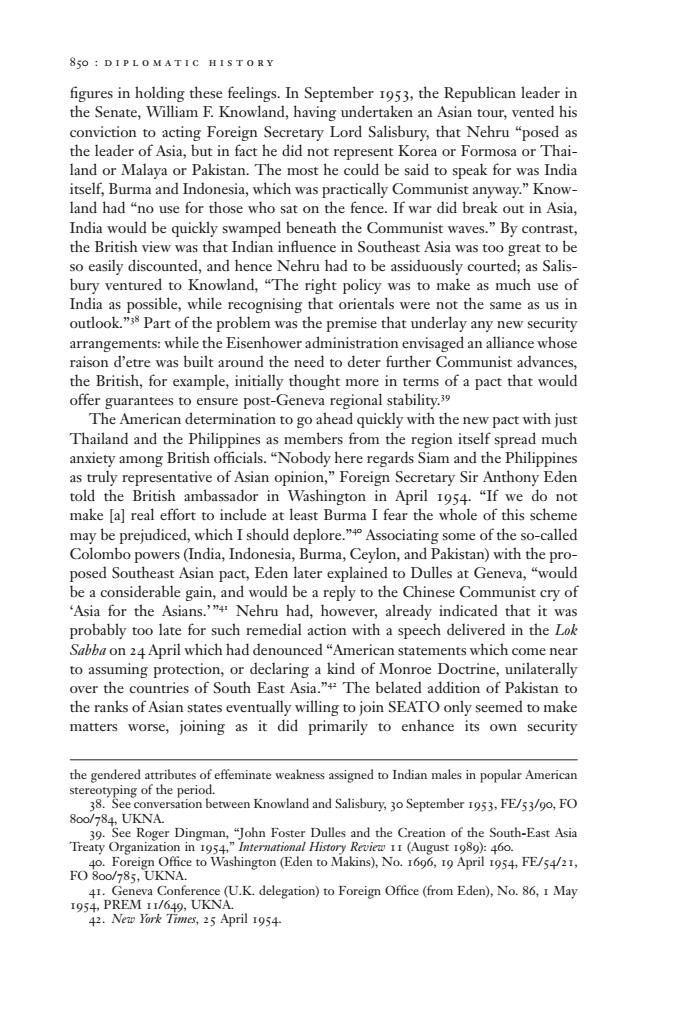正在加载图片...

850:DIPLOMATIC HISTORY figures in holding these feelings.In September 1953,the Republican leader in the Senate,William F.Knowland,having undertaken an Asian tour,vented his conviction to acting Foreign Secretary Lord Salisbury,that Nehru "posed as the leader of Asia,but in fact he did not represent Korea or Formosa or Thai- land or Malaya or Pakistan.The most he could be said to speak for was India itself,Burma and Indonesia,which was practically Communist anyway."Know- land had "no use for those who sat on the fence.If war did break out in Asia, India would be quickly swamped beneath the Communist waves.By contrast, the British view was that Indian influence in Southeast Asia was too great to be so easily discounted,and hence Nehru had to be assiduously courted;as Salis- bury ventured to Knowland,"The right policy was to make as much use of India as possible,while recognising that orientals were not the same as us in outlook."38 Part of the problem was the premise that underlay any new security arrangements:while the Eisenhower administration envisaged an alliance whose raison d'etre was built around the need to deter further Communist advances, the British,for example,initially thought more in terms of a pact that would offer guarantees to ensure post-Geneva regional stability.39 The American determination to go ahead quickly with the new pact with just Thailand and the Philippines as members from the region itself spread much anxiety among British officials."Nobody here regards Siam and the Philippines as truly representative of Asian opinion,"Foreign Secretary Sir Anthony Eden told the British ambassador in Washington in April 1954."If we do not make [a]real effort to include at least Burma I fear the whole of this scheme may be prejudiced,which I should deplore."Associating some of the so-called Colombo powers(India,Indonesia,Burma,Ceylon,and Pakistan)with the pro- posed Southeast Asian pact,Eden later explained to Dulles at Geneva,"would be a considerable gain,and would be a reply to the Chinese Communist cry of 'Asia for the Asians.'"Nehru had,however,already indicated that it was probably too late for such remedial action with a speech delivered in the Lok Sabba on 24 April which had denounced "American statements which come near to assuming protection,or declaring a kind of Monroe Doctrine,unilaterally over the countries of South East Asia."+The belated addition of Pakistan to the ranks of Asian states eventually willing to join SEATO only seemed to make matters worse,joining as it did primarily to enhance its own security the gendered attributes of effeminate weakness assigned to Indian males in popular American stereotyping of the period. 38.See conversation between Knowland and Salisbury,3o September 1953,FE/53/go,FO 8oo/784,UKNA. 39.See Roger Dingman,"John Foster Dulles and the Creation of the South-East Asia Treaty Organization in 1954,"International History Review 11(August 1989):460. 40.Foreign Office to Washington (Eden to Makins),No.1696,19 April 1954,FE/54/21, FO 8o0/785,UKNA. 41.Geneva Conference (U.K.delegation)to Foreign Office (from Eden),No.86,I May 1954,PREM 11/649,UKNA. 42.New York Times,25 April 1954figures in holding these feelings. In September 1953, the Republican leader in the Senate, William F. Knowland, having undertaken an Asian tour, vented his conviction to acting Foreign Secretary Lord Salisbury, that Nehru “posed as the leader of Asia, but in fact he did not represent Korea or Formosa or Thailand or Malaya or Pakistan. The most he could be said to speak for was India itself, Burma and Indonesia, which was practically Communist anyway.” Knowland had “no use for those who sat on the fence. If war did break out in Asia, India would be quickly swamped beneath the Communist waves.” By contrast, the British view was that Indian influence in Southeast Asia was too great to be so easily discounted, and hence Nehru had to be assiduously courted; as Salisbury ventured to Knowland, “The right policy was to make as much use of India as possible, while recognising that orientals were not the same as us in outlook.”38 Part of the problem was the premise that underlay any new security arrangements: while the Eisenhower administration envisaged an alliance whose raison d’etre was built around the need to deter further Communist advances, the British, for example, initially thought more in terms of a pact that would offer guarantees to ensure post-Geneva regional stability.39 The American determination to go ahead quickly with the new pact with just Thailand and the Philippines as members from the region itself spread much anxiety among British officials. “Nobody here regards Siam and the Philippines as truly representative of Asian opinion,” Foreign Secretary Sir Anthony Eden told the British ambassador in Washington in April 1954. “If we do not make [a] real effort to include at least Burma I fear the whole of this scheme may be prejudiced, which I should deplore.”40 Associating some of the so-called Colombo powers (India, Indonesia, Burma, Ceylon, and Pakistan) with the proposed Southeast Asian pact, Eden later explained to Dulles at Geneva, “would be a considerable gain, and would be a reply to the Chinese Communist cry of ‘Asia for the Asians.’”41 Nehru had, however, already indicated that it was probably too late for such remedial action with a speech delivered in the Lok Sabha on 24 April which had denounced “American statements which come near to assuming protection, or declaring a kind of Monroe Doctrine, unilaterally over the countries of South East Asia.”42 The belated addition of Pakistan to the ranks of Asian states eventually willing to join SEATO only seemed to make matters worse, joining as it did primarily to enhance its own security 850 : diplomatic history the gendered attributes of effeminate weakness assigned to Indian males in popular American stereotyping of the period. 38. See conversation between Knowland and Salisbury, 30 September 1953, FE/53/90, FO 800/784, UKNA. 39. See Roger Dingman, “John Foster Dulles and the Creation of the South-East Asia Treaty Organization in 1954,” International History Review 11 (August 1989): 460. 40. Foreign Office to Washington (Eden to Makins), No. 1696, 19 April 1954, FE/54/21, FO 800/785, UKNA. 41. Geneva Conference (U.K. delegation) to Foreign Office (from Eden), No. 86, 1 May 1954, PREM 11/649, UKNA. 42. New York Times, 25 April 1954